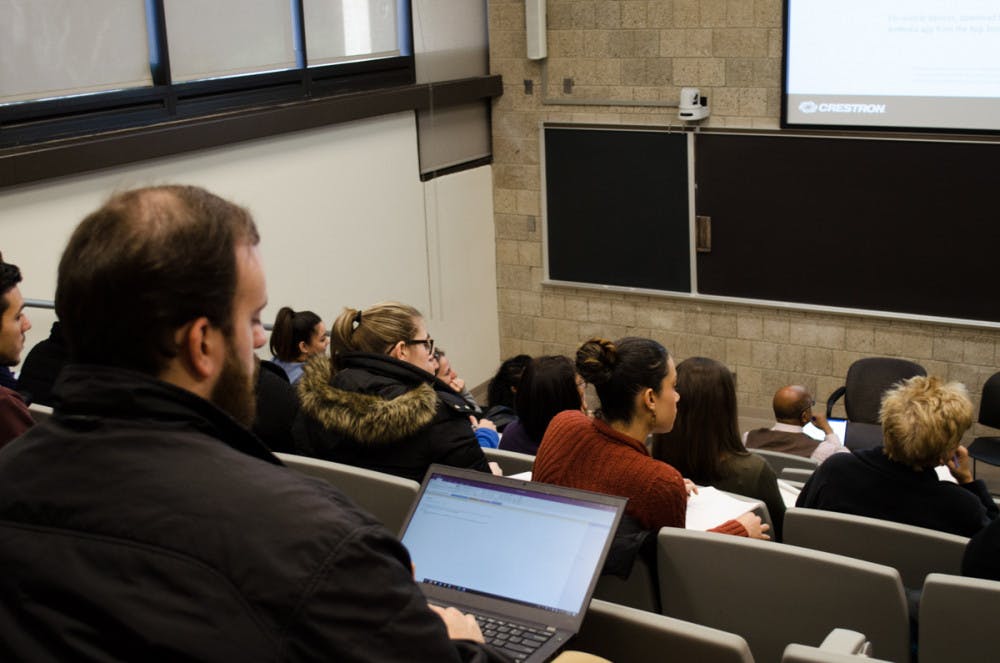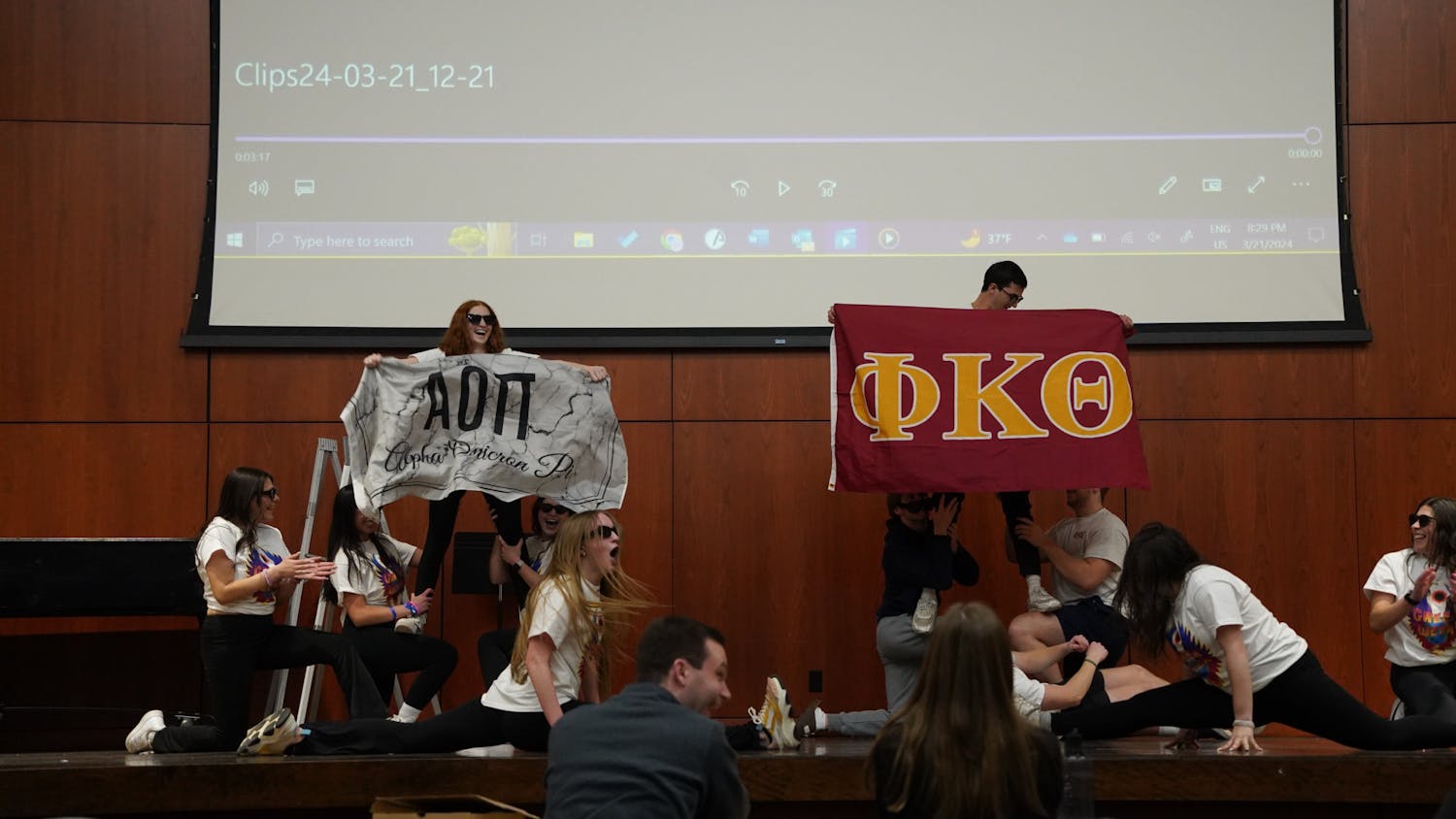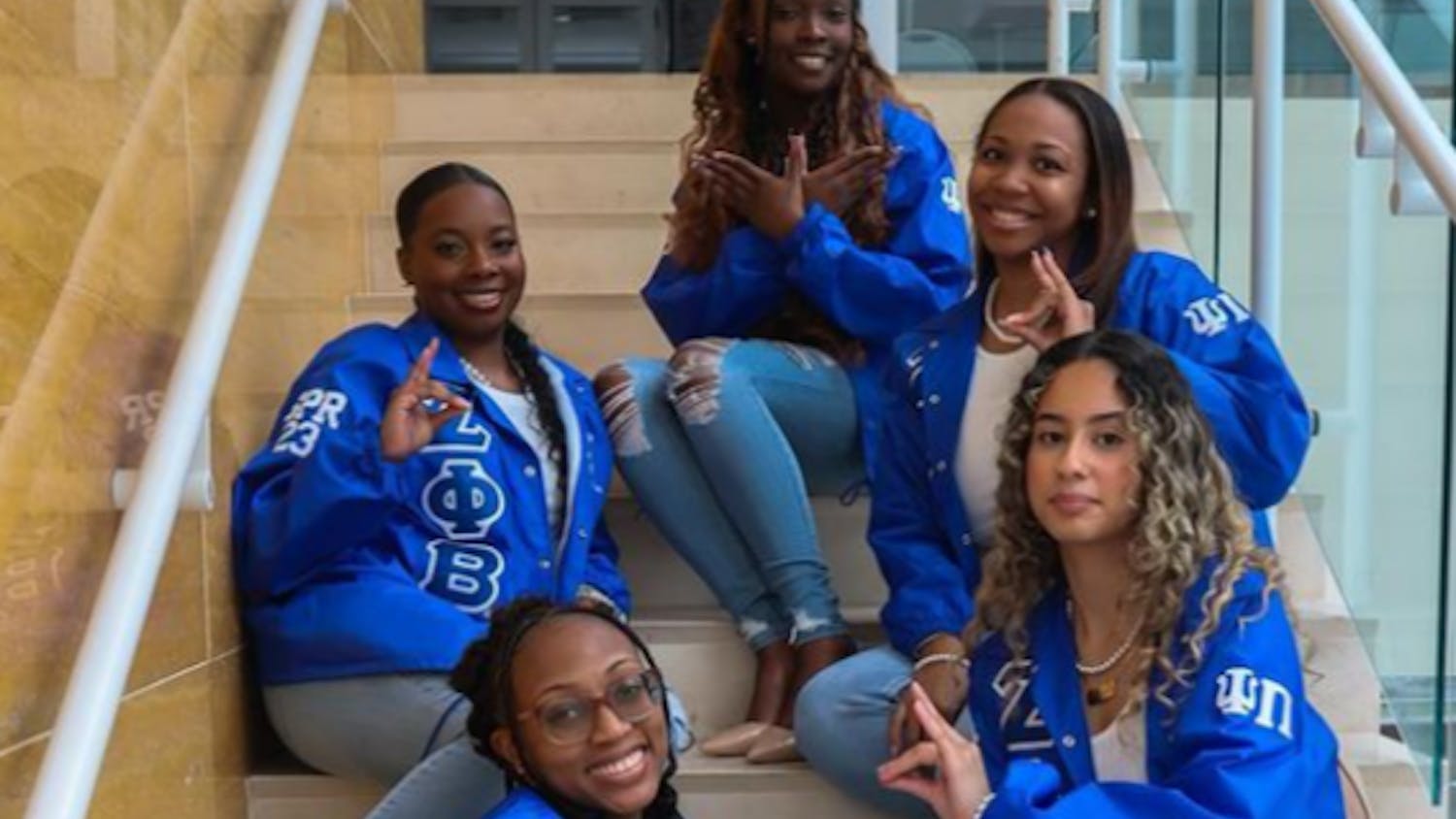On Nov. 21, the Center for Faculty Development sponsored a session aimed at suggesting ways faculty can facilitate the conversation with students about current events in their classes.
The event, titled “Teaching after Charlottesville,” featured a panel of Seton Hall faculty from various departments speaking about different approaches they take when discussing emotionally-charged subjects.
[caption id="attachment_20850" align="aligncenter" width="838"] Professors brainstormed ways to approach race and issues important to students in their classes. Abigail Deffler/Staff Photographer[/caption]
The panel consisted of Dr. W. King Mott, associate professor of political science; Dr. Elizabeth Redwine and Angela Kariotis, both instructors in the English Department; and Rev. Forrest Pritchett, assistant dean of the Black Studies Center and a faculty mentor in the Freshman Studies Program.
The main theme shared by the panel was finding a way to create a safe environment to facilitate these conversations with students. Various ideas the panel discussed included the possibility of introducing a one-credit course for students called “community life” in which students are freely able to discuss the topic of race.
Kariotis, who suggested the course and teaches in the College of Communication and the Arts, stressed her passion for creating a safe space in her oral communication class.
“I have to de-center myself as the authority in the classroom and allow space for emotion eruptions,” Kariotis said. “I have to open my classroom to those who can have the conversation better than me. If I do not open my classrooms for these kinds experiences and conversations, it may never happen.”
Dr. Mary Balkun, who has served as the director of the center for three years, has offered various events for faculty to attend so that they feel more comfortable talking about diverse ideas with students. The panel was similar to ones that universities across the country have sponsored, addressing racist and white supremacy protests this past summer in Charlottesville, V.A., as well as other modern events ranging from race relations to sexual harassment.
“It’s important that we have these conversations,” Balkun said. “Students want to talk about these things and faculty aren’t always sure how to deal with it. I think it’s important to have an ongoing conversation about this.”
The event was faculty focused, but Balkun said she welcomes students attending and joining the conversation.
Two students present were quick to voice their thoughts on how professors and the University could better at addressing these issues.
Emani Miles, a sophomore Africana studies and political science major, was one of the students present. As a member of several cultural groups on campus addressing issues of race, Miles said that students are working together to confront the rally in Charlottesville, but would like to see more faculty support.
“Students already do a really good job at addressing these concerns,” Miles said. “We have programs every single night that invite administration, faculty, and their classes that are dealing with these issues. We invited a couple of deans to our events last semester and they didn’t come.”
Miles’ frustration with the lack of faculty attendance relates to scheduling.
Balkun admitted that faculty want to attend these events but are not on campus after 5 p.m. because of other engagements. She said she hopes that students and faculty can find some common ground to bring forth changes on campus.
“If they think that more faculty need this they can let me know and I will continue to run these sessions,” Balkun said. “I’m happy to work with them if they have any ideas for the kind of sessions.”
Nicholas Mariano can be reached at nicholas.mariano@student.shu.
Professors brainstormed ways to approach race and issues important to students in their classes. Abigail Deffler/Staff Photographer[/caption]
The panel consisted of Dr. W. King Mott, associate professor of political science; Dr. Elizabeth Redwine and Angela Kariotis, both instructors in the English Department; and Rev. Forrest Pritchett, assistant dean of the Black Studies Center and a faculty mentor in the Freshman Studies Program.
The main theme shared by the panel was finding a way to create a safe environment to facilitate these conversations with students. Various ideas the panel discussed included the possibility of introducing a one-credit course for students called “community life” in which students are freely able to discuss the topic of race.
Kariotis, who suggested the course and teaches in the College of Communication and the Arts, stressed her passion for creating a safe space in her oral communication class.
“I have to de-center myself as the authority in the classroom and allow space for emotion eruptions,” Kariotis said. “I have to open my classroom to those who can have the conversation better than me. If I do not open my classrooms for these kinds experiences and conversations, it may never happen.”
Dr. Mary Balkun, who has served as the director of the center for three years, has offered various events for faculty to attend so that they feel more comfortable talking about diverse ideas with students. The panel was similar to ones that universities across the country have sponsored, addressing racist and white supremacy protests this past summer in Charlottesville, V.A., as well as other modern events ranging from race relations to sexual harassment.
“It’s important that we have these conversations,” Balkun said. “Students want to talk about these things and faculty aren’t always sure how to deal with it. I think it’s important to have an ongoing conversation about this.”
The event was faculty focused, but Balkun said she welcomes students attending and joining the conversation.
Two students present were quick to voice their thoughts on how professors and the University could better at addressing these issues.
Emani Miles, a sophomore Africana studies and political science major, was one of the students present. As a member of several cultural groups on campus addressing issues of race, Miles said that students are working together to confront the rally in Charlottesville, but would like to see more faculty support.
“Students already do a really good job at addressing these concerns,” Miles said. “We have programs every single night that invite administration, faculty, and their classes that are dealing with these issues. We invited a couple of deans to our events last semester and they didn’t come.”
Miles’ frustration with the lack of faculty attendance relates to scheduling.
Balkun admitted that faculty want to attend these events but are not on campus after 5 p.m. because of other engagements. She said she hopes that students and faculty can find some common ground to bring forth changes on campus.
“If they think that more faculty need this they can let me know and I will continue to run these sessions,” Balkun said. “I’m happy to work with them if they have any ideas for the kind of sessions.”
Nicholas Mariano can be reached at nicholas.mariano@student.shu.

Comments




